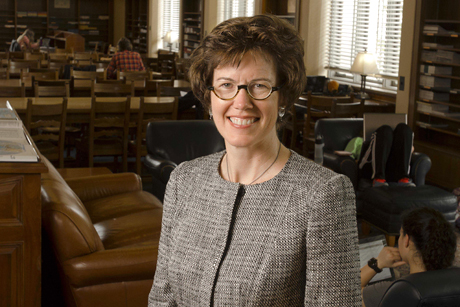Gretchen Ritter '83 named dean of Arts and Sciences
By Daniel Aloi

Gretchen Ritter ’83, professor of government and vice provost for undergraduate education and faculty governance at the University of Texas at Austin, has been named the 21st dean of Cornell’s College of Arts and Sciences, Provost Kent Fuchs announced April 11.
A third-generation Cornellian, Ritter is the college’s first woman and first externally hired dean. Her Cornell appointment is effective Aug. 1, 2013.
“We are welcoming a new dean with a distinguished academic career, well demonstrated leadership abilities and a creative vision for Arts and Sciences,” said Fuchs. “Cornell is fortunate that Gretchen Ritter has chosen to return to her alma mater.”
“As someone who grew up in upstate New York and got a great education at Cornell, coming back to Arts and Sciences will be something of a homecoming for me," said Ritter. “I am honored and humbled to have the opportunity to serve as the next dean of this great college. Cornell is a special place – as I know from my years of having been a student there. I look forward to working with the college's extraordinary students, faculty and alumni in making a great college even stronger in the years to come.”
As the academic, administrative and community leader of the college, Ritter will have responsibility for building its intellectual, financial and human capacity and capabilities; enhancing its reputation, distinction and influence; and improving the quality of the student experience. She also will have a key leadership role in the current initiative to hire new faculty.
Ritter has a bachelor’s degree in government from Cornell and a Ph.D. in political science from the Massachusetts Institute of Technology. She has been on the UT-Austin faculty since 1992, where she is a professor of government. From 2004-09, she directed its Center for Women’s and Gender Studies, the university’s largest interdisciplinary program with more than 250 faculty affiliates. In addition to overseeing the center’s research, teaching and outreach initiatives, Ritter created a faculty development program and established a community advisory board for fundraising and community outreach.
As a scholar, she has published numerous journal articles, authored two books – “The Constitution as Social Design: Gender and Civic Membership in the American Constitutional Order” (2006) and “Goldbugs and Greenbacks: The Antimonopoly Tradition and the Politics of Finance in America, 1865–1896” (1997) – and co-edited “Democratization in America: A Comparative and Historical Perspective” (2009).
As vice provost at UT-Austin since 2009, Ritter has oversight for university standing committees, academic advising and program approvals, review of undergraduate curriculum and all faculty legislation, and administering campus wide teaching awards. She convenes the Provost’s Council on Academic Advising, chairs the university’s Committee on Undergraduate Program Review, and serves on executive committee of the Faculty Council.
Ritter created the Council of Academic Support Programs in 2010 to coordinate and share best practices for programs to improve retention and support academic success, particularly for students from underrepresented populations.
Her office’s largest new initiative was the Course Transformation Program, created in 2010 to redesign large lower division gateway courses like the introductory courses in biology, chemistry, psychology, comparative literature and economics. The program works by strengthening pathways to success and promoting deeper learning, using insights from cognitive psychology and opportunities created by educational technologies. The program has resulted in significant improvements in grades, learning outcomes and student retention.
She has taught courses in American politics, democratic theory, citizenship and nationalism, and Constitutional development, among others, for both undergraduates and graduate students.
Ritter will succeed Peter Lepage, the Harold Tanner Dean of the college since 2003. Lepage will return to teaching and continue his research as a Cornell physicist and his service on the National Science Board, the governing body of the National Science Foundation. His board appointment was announced by President Barack Obama in November. Lepage joined the Cornell faculty in 1980 and chaired the Department of Physics from 1999-2003; during his tenure as dean, he has maintained a research program in quantum physics.
Media Contact
Get Cornell news delivered right to your inbox.
Subscribe